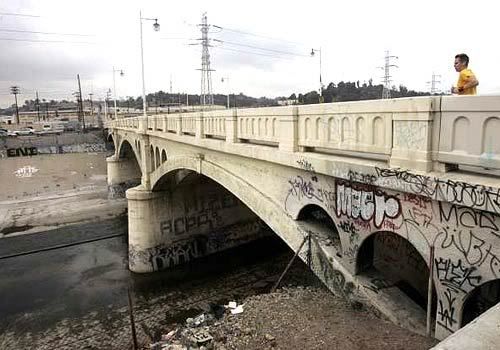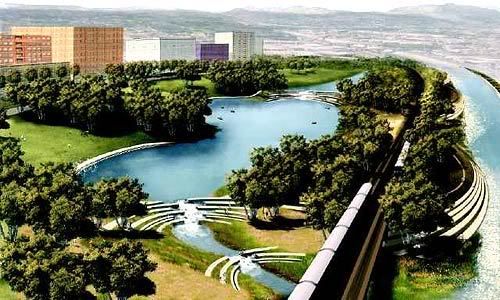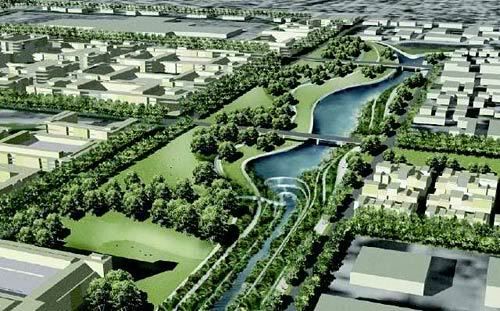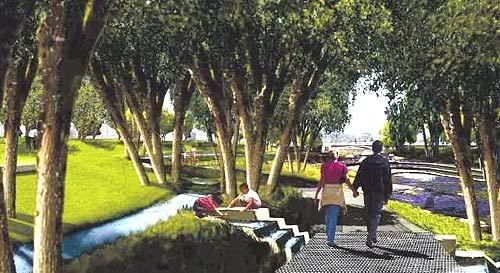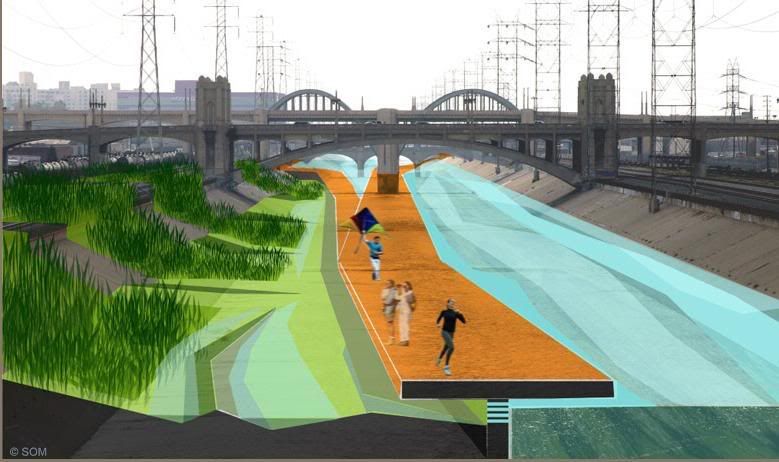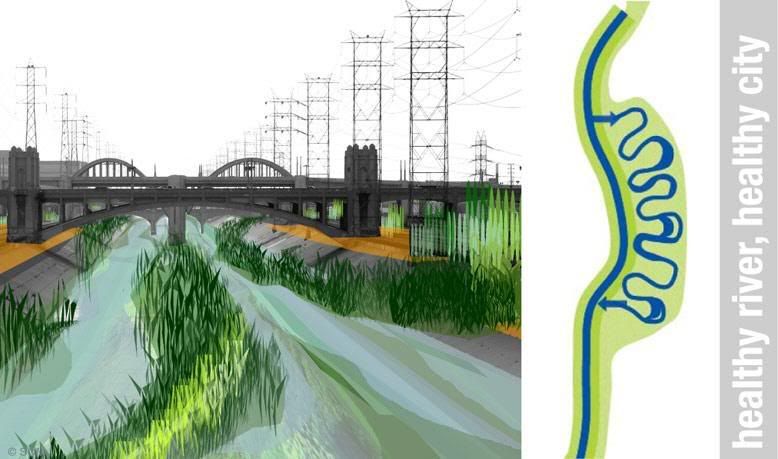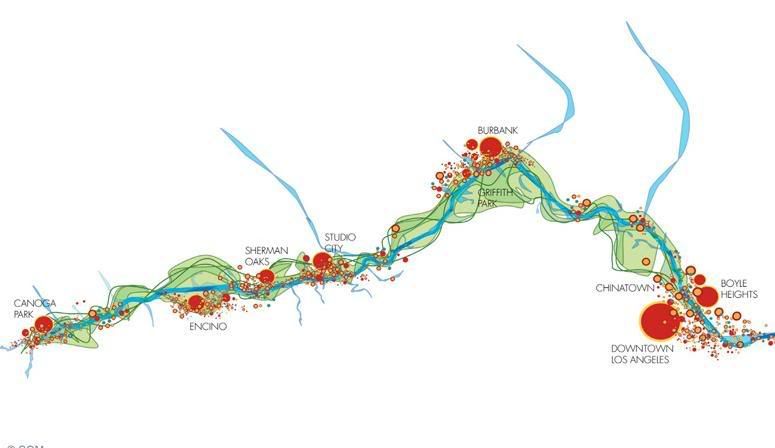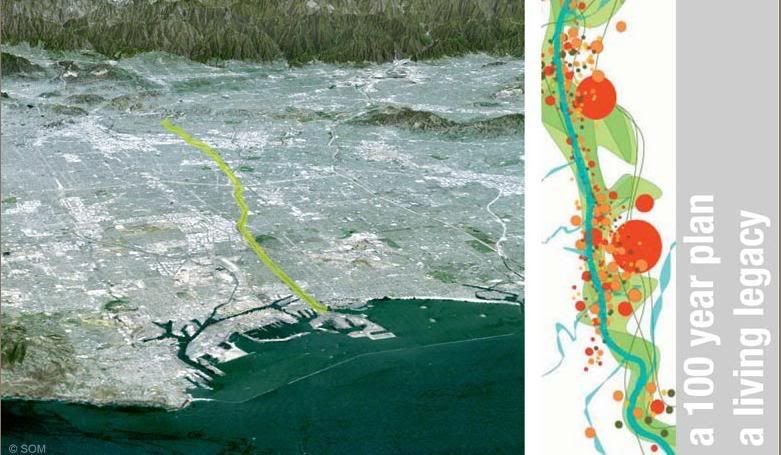88m3
Fast Money & Foreign Objects
By John Gittelsohn and Alan Ohnsman Jun 25, 2014 6:00 AM ET
3 Comments Email Print
Save

Photographer: Jean-Paul Aussenard/WireImage via Getty Images
"Terminator 2" clip presented in Windows Media High Definition Video.

Photographer: Patrick T. Fallon/Bloomberg
A commuter train rides alongside the Los Angeles River. The plan is to landscape an 11-mile stretch north of... Read More

Photographer: Patrick T. Fallon/Bloomberg
Poet and writer Lewis MacAdams, founder of Friends of the Los Angeles River, stands on the Buena Vista Bridge over... Read More

Photographer: Patrick T. Fallon/Bloomberg
A man fishes on the Los Angeles River. While revived waterfronts have driven development from San Antonio to New... Read More
Right now the river of his dreams is the concrete flood channel where an 18-wheeler chased Arnold Schwarzenegger on aHarley in “Terminator 2: Judgment Day,” one of the movies that used the 200-foot-wide (60-meter) ditch to depict industrial bleakness. A U.S. Army Corps of Engineers plan to return the Los Angeles River to a more natural state would cost $1 billion and has speculators circling even before the funding’s in place.
“The private money is already moving,” said Stapleton, a vice president at commercial real-estate brokerage Jones Lang LaSalle Inc. (JLL)“They’re looking for opportunities. It’s the private money that’s going to make the vision happen.”
While revived waterfronts have driven development from San Antonio to New York, it’s hard to picture the L.A. River being a party to anything like that. Untamed, it looks more like a desert arroyo than London’s River Thames. Even in the wet season it doesn’t exactly gush, and much of the liquid in it is from waste-treatment plants.
“Some pretty dramatic work will have to be done,” said Henry Cisneros, a former San Antonio mayor and chairman of the investment firm CityView, which partnered with Blackstone Group LP (BX) on a 2013 L.A. condo project. “But I can see how it could happen because people are always attracted to water.”
Plastic Bags
The plan is to landscape an 11-mile (18-kilometer) stretch north of downtown, carpeting parts of the riverbed with grass and trees, installing parks and playing fields, creating wetlands and wildlife habitat. It might look something like the four miles bounding Griffith Park that’s undergone rehab work and has begun hosting kayak excursions. Herons and egrets nest among reeds and cottonwoods there. Anglers hook small fish, along with beer cans and plastic bags.
Some developers have built with restoration in mind. One Santa Fe, a $160 million apartment and retail complex in the downtown Arts District, was designed for water views -- through a rail yard that sits between the six-story building and the concrete banks about 100 yards (90 meters) away.
“We’ve kept it open so it looks all the way through to the rails and ultimately to the river,” said Bill McGregor, president of McGregor Brown Co., the lead developer of One Santa Fe with investors including Goldman Sachs Group Inc. (GS) and Canyon Partners LLC. “Although,” he acknowledged, at the moment “there’s no river you see.”
‘Land Boom’
Home prices have jumped in the river-adjacent Elysian Valley north of Dodger Stadium, a neighborhood known to locals as Frogtown. The median single-family home price in the postal code was $699,000 in the first quarter, up 16 percent from a year earlier, and the median condo went for $388,000, up 31 percent, according to real-estate information service DataQuick.
“It has the quality of a recently discovered area, and there’s definitely a kind of land boom,” said Lewis MacAdams, co-founder of Friends of the Los Angeles River.
The potential lured Robert De Forest, principal of Terra River LLC, who’s worked on river-related real estate since the 1990s. He acquired seven parcels totaling an acre in the neighborhood, making his last purchase in January, before asking prices soared as restoration expectations rose.
Horchata Ale
“Anytime you announce the potential for $1 billion of public investment, antennae go up and speculators take notice,” De Forest, whose plan is to develop live-work creative spaces, said in an e-mail. So far, he said, there have been more lookers than buyers.
If buyers materialize, there’s a risk gentrification will spoil the mix of homes, artist studios, small factories and craft-oriented businesses that give Elysian Valley its distinct flavor, said David Dedlow, whose Framatic Co. has made ready-to-use picture frames at a factory there for 30 years.
“There’s a small industrial strip left from the times when people thought of the river area as a dump,” he said. “There’s a fence now between the neighborhood and the river, and we don’t want to see that replaced with rows of three-story apartments.”
The boom is already on in the neighborhood of Boyle Heights, where Dave Hodgins has been working with the private-public L.A. River Revitalization Corp. to start the first microbrewery along the channel. Hodgins said he expects to sign a lease for Dry River Brewing this month and open a tasting room serving horchata-spiced cream ale next year.
‘Mega Fauna’
Hodgins’ site search took 18 months, he said, because of tight inventory and property owners who kept raising their prices. “Asking rents are getting crazy, crazy, crazy.”
The restoration push began in the 1980s with the founding of Friends of the L.A. River. The group lobbied politicians and organized cleanups to remove trash and “mega fauna,” MacAdams’s term for abandoned cars and shopping carts. After decades of advocacy, “things are about to get interesting,” said MacAdams, 69, a poet who was Los Angeles Mayor Eric Garcetti’s high school writing teacher.
The plan drafted by the Army Corps, which maintains the river, was approved by Jo-Ellen Darcy, assistant secretary of the Army for civil works, on May 27. President Barack Obama, who Garcetti personally lobbied, endorsed the plan, too.
The next hurdle: money. Congress has to authorize the Corps’ $500 million share. The city is aiming to raise the rest during the next decade from state funds, other federal sources, charitable contributions and public-private partnerships, according to Vicki Curry, a spokeswoman for Garcetti.
‘Repo Man’
Until the Los Angeles Aqueduct opened in 1913, importing snowmelt from the Sierra Nevada Mountains, the 51-mile-long river was a source of drinking water -- and a natural disaster when it overflowed. A 1938 deluge ensured support to encase the banks, bed and tributaries in concrete. Now the river’s fed naturally and by reclaimed treatment-plant water.
The cementscape was a draw for drag racers in the ’50s and ’60s, as depicted in the John Travolta movie “Grease.” Later it offered a canvas for gang taggers and graffiti artists, and providedsettings for the films “Escape from New York” and “Repo Man.”
Stapleton has received nine offers for the junkyard he’s trying to sell -- many at the $88-a-square-foot asking price. He said similar parcels went for about $50 a couple of years ago. Some sellers want $150, he said. Land in high-density areas downtown command $450 a foot.
“The river redevelopment is going to put on a bigger spotlight in the area,” he said. But it’s “going to take time for the dream to become reality.”
http://www.bloomberg.com/news/2014-...-l-a-land-prices-crazy.html?cmpid=fb.campaign
3 Comments Email Print
Save

Photographer: Jean-Paul Aussenard/WireImage via Getty Images
"Terminator 2" clip presented in Windows Media High Definition Video.

Photographer: Patrick T. Fallon/Bloomberg
A commuter train rides alongside the Los Angeles River. The plan is to landscape an 11-mile stretch north of... Read More

Photographer: Patrick T. Fallon/Bloomberg
Poet and writer Lewis MacAdams, founder of Friends of the Los Angeles River, stands on the Buena Vista Bridge over... Read More

Photographer: Patrick T. Fallon/Bloomberg
A man fishes on the Los Angeles River. While revived waterfronts have driven development from San Antonio to New... Read More
- Slide 1
- Slide 2
- Slide 3
- Slide 4
Right now the river of his dreams is the concrete flood channel where an 18-wheeler chased Arnold Schwarzenegger on aHarley in “Terminator 2: Judgment Day,” one of the movies that used the 200-foot-wide (60-meter) ditch to depict industrial bleakness. A U.S. Army Corps of Engineers plan to return the Los Angeles River to a more natural state would cost $1 billion and has speculators circling even before the funding’s in place.
“The private money is already moving,” said Stapleton, a vice president at commercial real-estate brokerage Jones Lang LaSalle Inc. (JLL)“They’re looking for opportunities. It’s the private money that’s going to make the vision happen.”
While revived waterfronts have driven development from San Antonio to New York, it’s hard to picture the L.A. River being a party to anything like that. Untamed, it looks more like a desert arroyo than London’s River Thames. Even in the wet season it doesn’t exactly gush, and much of the liquid in it is from waste-treatment plants.
“Some pretty dramatic work will have to be done,” said Henry Cisneros, a former San Antonio mayor and chairman of the investment firm CityView, which partnered with Blackstone Group LP (BX) on a 2013 L.A. condo project. “But I can see how it could happen because people are always attracted to water.”
Plastic Bags
The plan is to landscape an 11-mile (18-kilometer) stretch north of downtown, carpeting parts of the riverbed with grass and trees, installing parks and playing fields, creating wetlands and wildlife habitat. It might look something like the four miles bounding Griffith Park that’s undergone rehab work and has begun hosting kayak excursions. Herons and egrets nest among reeds and cottonwoods there. Anglers hook small fish, along with beer cans and plastic bags.
Some developers have built with restoration in mind. One Santa Fe, a $160 million apartment and retail complex in the downtown Arts District, was designed for water views -- through a rail yard that sits between the six-story building and the concrete banks about 100 yards (90 meters) away.
“We’ve kept it open so it looks all the way through to the rails and ultimately to the river,” said Bill McGregor, president of McGregor Brown Co., the lead developer of One Santa Fe with investors including Goldman Sachs Group Inc. (GS) and Canyon Partners LLC. “Although,” he acknowledged, at the moment “there’s no river you see.”
‘Land Boom’
Home prices have jumped in the river-adjacent Elysian Valley north of Dodger Stadium, a neighborhood known to locals as Frogtown. The median single-family home price in the postal code was $699,000 in the first quarter, up 16 percent from a year earlier, and the median condo went for $388,000, up 31 percent, according to real-estate information service DataQuick.
“It has the quality of a recently discovered area, and there’s definitely a kind of land boom,” said Lewis MacAdams, co-founder of Friends of the Los Angeles River.
The potential lured Robert De Forest, principal of Terra River LLC, who’s worked on river-related real estate since the 1990s. He acquired seven parcels totaling an acre in the neighborhood, making his last purchase in January, before asking prices soared as restoration expectations rose.
Horchata Ale
“Anytime you announce the potential for $1 billion of public investment, antennae go up and speculators take notice,” De Forest, whose plan is to develop live-work creative spaces, said in an e-mail. So far, he said, there have been more lookers than buyers.
If buyers materialize, there’s a risk gentrification will spoil the mix of homes, artist studios, small factories and craft-oriented businesses that give Elysian Valley its distinct flavor, said David Dedlow, whose Framatic Co. has made ready-to-use picture frames at a factory there for 30 years.
“There’s a small industrial strip left from the times when people thought of the river area as a dump,” he said. “There’s a fence now between the neighborhood and the river, and we don’t want to see that replaced with rows of three-story apartments.”
The boom is already on in the neighborhood of Boyle Heights, where Dave Hodgins has been working with the private-public L.A. River Revitalization Corp. to start the first microbrewery along the channel. Hodgins said he expects to sign a lease for Dry River Brewing this month and open a tasting room serving horchata-spiced cream ale next year.
‘Mega Fauna’
Hodgins’ site search took 18 months, he said, because of tight inventory and property owners who kept raising their prices. “Asking rents are getting crazy, crazy, crazy.”
The restoration push began in the 1980s with the founding of Friends of the L.A. River. The group lobbied politicians and organized cleanups to remove trash and “mega fauna,” MacAdams’s term for abandoned cars and shopping carts. After decades of advocacy, “things are about to get interesting,” said MacAdams, 69, a poet who was Los Angeles Mayor Eric Garcetti’s high school writing teacher.
The plan drafted by the Army Corps, which maintains the river, was approved by Jo-Ellen Darcy, assistant secretary of the Army for civil works, on May 27. President Barack Obama, who Garcetti personally lobbied, endorsed the plan, too.
The next hurdle: money. Congress has to authorize the Corps’ $500 million share. The city is aiming to raise the rest during the next decade from state funds, other federal sources, charitable contributions and public-private partnerships, according to Vicki Curry, a spokeswoman for Garcetti.
‘Repo Man’
Until the Los Angeles Aqueduct opened in 1913, importing snowmelt from the Sierra Nevada Mountains, the 51-mile-long river was a source of drinking water -- and a natural disaster when it overflowed. A 1938 deluge ensured support to encase the banks, bed and tributaries in concrete. Now the river’s fed naturally and by reclaimed treatment-plant water.
The cementscape was a draw for drag racers in the ’50s and ’60s, as depicted in the John Travolta movie “Grease.” Later it offered a canvas for gang taggers and graffiti artists, and providedsettings for the films “Escape from New York” and “Repo Man.”
Stapleton has received nine offers for the junkyard he’s trying to sell -- many at the $88-a-square-foot asking price. He said similar parcels went for about $50 a couple of years ago. Some sellers want $150, he said. Land in high-density areas downtown command $450 a foot.
“The river redevelopment is going to put on a bigger spotlight in the area,” he said. But it’s “going to take time for the dream to become reality.”
http://www.bloomberg.com/news/2014-...-l-a-land-prices-crazy.html?cmpid=fb.campaign
 Make that property fall fall fall, friends.
Make that property fall fall fall, friends.
